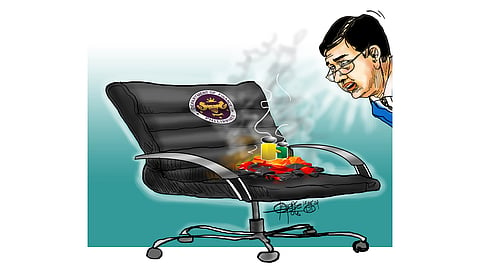
- NEWS
- the EDIT
- COMMENTARY
- BUSINESS
- LIFE
- SHOW
- ACTION
- GLOBAL GOALS
- SNAPS
- DYARYO TIRADA
- MORE

The heat on the seat where Finance Secretary Ralph Recto sits is getting hotter, and not a few are wondering how long until his resolve to defend his directive to transfer funds from state health insurance provider, PhilHealth, to state coffers for funding unprogrammed projects would melt into a puddle of water.
Opponents challenging the controversial move are formidable. Among these are former senior associate High Court Justice Antonio Carpio and other such past officials as National Economic Development Authority director generals Cielito Habito and Ernesto Pernia, former Budget and Management Secretary Florencio Abad, and former Health Secretary Enrique Ona.
At the Senate, principal sponsor of the Universal Health Care law Senator JV Ejercito, stressing that PhilHealth’s excess funds could greatly help more poor patients, called for a probe on the fund transfer. Last Wednesday, Ejercito also asked for the head of PhilHealth president and CEO, Emmanuel Ledesma Jr. for “failing to live up to the purpose of the UHC law.”
Oppositors have also warned that the transfer of funds to the Treasury could compromise the administration’s senatorial bets’ victory in the 2025 midterm elections as the public could very well see this as for use to finance the administration’s senatorial bets’ campaign in the 2025 midterm elections.
Political analyst Dennis Concepcion points out that the “administration is usually preoccupied around this time with sourcing funds for the electoral campaign of its candidates. Thus the SC should do its part in protecting PhilHealth funds by either issuing a TRO or ruling against its transfer, altogether.”
The central point in arguments against the transfer of PhilHealth’s funds has to do with constitutionality.
Remitting excess PhilHealth funds to the Treasury to finance unprogrammed appropriations, including the congressional pork barrel, violates the Constitution on at least two grounds, underscores Carpio.
The former Supreme Court associate justice wrote Carpio to remind him that the General Appropriations Act provides that only the President is authorized to transfer savings from one item to another in Executive branch appropriations.
Delegating that power to the Finance Secretary to transfer savings from government-owned-and-controlled corporations to the Treasury “is unconstitutional, as it is an undue delegation of constitutional power that belongs exclusively to the President.”
Also, the two transfers of “idle or unused funds” from PhilHealth result in technical malversation or public funds and “constitute the crime of plunder.”
PhilHealth’s funds are special funds raised through taxation for a specific purpose — the universal health of Filipinos — and if the Finance Secretary fails to recall the funds, Carpio and Calleja said they will be constrained to challenge its transfer.
Meanwhile, Cielo Magno, a member of the original group that had petitioned the SC to block the fund transfer questioned the appropriateness of diverting resources intended for social insurance to fund other government programs.
Magno, who served as Undersecretary for the DoF’s Fiscal Policy and Monitoring Group for a year and had quit her post in 2023 due to policy differences with Malacañang, asked, “As financial technocrats, shouldn’t we protect the integrity of our social health insurance and ensure that it effectively serves its intended purpose?”
The former DoF exec, who had just been named co-chair of the UN Open Government Partnership Steering Committee along with Spain which will host the Open Government Partnership Global Summit in 2025, said the Finance Secretary “should be reminded that a functioning social health insurance program is part of our aspirations, and taking away PhilHealth funds to finance other government programs clearly minimizes the value of the health of the Filipino people.”
